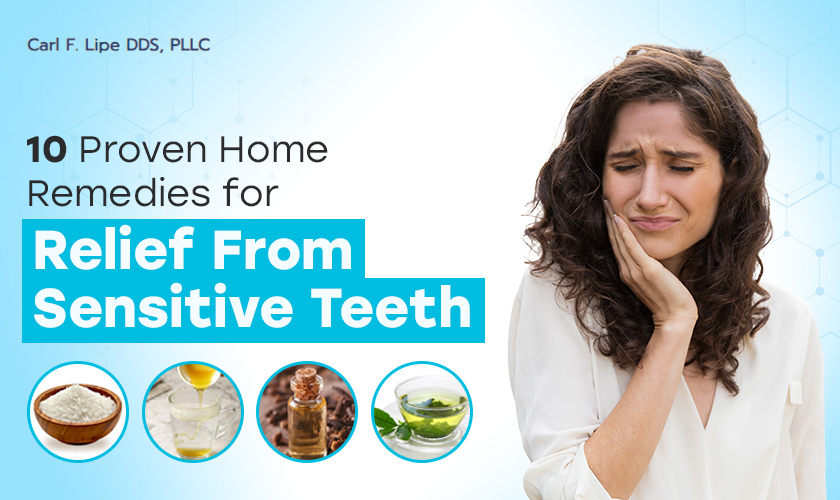Sensitive teeth can hinder everyday activities like drinking a hot cup of coffee or a cold scoop of your favorite ice cream, making them more painful and uncomfortable. Sensitivity is a common dental issue that occurs when the protective layer of your teeth gets decayed or gums recede. This exposes the underlying dentin, and as a result, sharp and sudden pain is felt by hot, cold, acidic, or sweet drinks.
But worry not; you can find quick relief from this discomfort by trying some simple home remedies. In this blog, we aim to discuss ten effective and proven home remedies that will help you manage teeth sensitivity. If you have ever searched for “how to stop sensitive teeth pain immediately,” this blog is definitely for you.

What Factors Can Cause Sensitivity To Your Teeth?
Sudden tooth sensitivity can occur due to various factors. A few common causes include the erosion of the enamel layer of the teeth by acidic foods, brushing aggressively, and the recession of gums exposing the tooth roots. The enamel layer of your teeth protects dentin, the most essential part of your tooth. It contains microtubules directly connecting to the tooth pulp where nerve endings are found. Hence, if the protective layer of dentin decays, the nerve endings will be exposed, resulting in sensitivity.
Also, dental processes like teeth whitening can cause teeth sensitivity. In some cases, cavities, cracked teeth, and grinding or clenching your teeth can result in higher sensitivity by wearing down the enamel layer.
Home Remedies For Quick Relief from Teeth Sensitivity
1. Saltwater Rinse
Salt is widely known for its antiseptic properties. It helps to reduce inflammation. In sudden swelling and pain, a saltwater rinse and spitting it out can kill the bacterial growth. Mix half a teaspoon of salt in lukewarm water and allow it to swish around your mouth. Please do it for 30 seconds before spitting it out. Repeat twice a day for optimal results.
2. Fluoride Toothpaste
Fluoride helps to reduce the threats of cavities by 25% and strengthens teeth. It can remineralize the protective layer of a tooth. Thus, using fluoride toothpaste daily can help you fight the reasons for sensitivity and help rebuild the enamel.
3. Avoid Acidic Foods and Beverages
Acidic foods and drinks, including citrus fruits, soda, and wine, contain acidic elements that erode tooth enamel, causing increased sensitivity in teeth. Decreasing the consumption of these items may help relieve discomfort in teeth.
4. Oil Pulling
Oil pulling is an ancient Ayurvedic practice involving swishing coconut oil around your mouth for 10-15 minutes. It helps eliminate bacteria and reduce plaque build-up, promoting overall oral health.
5. Honey and Warm Water
Honey contains antibacterial properties, which can provide temporary relief from gum inflammation. Mixing honey in warm water as a mouthwash may offer temporary respite from any associated sensitivity issues.
6. Green Tea
Drinking unsweetened green tea regularly or using it as a mouth rinse can help strengthen teeth while decreasing sensitivity, making green tea an excellent natural remedy.
7. Desensitizing Mouthwash
Desensitizing mouthwashes can provide temporary relief from sensitive teeth by creating a protective shield over exposed dentin, helping reduce discomfort over time. Regular use may help improve symptoms.
8. Clove Oil
Clove oil has long been utilized as a means to alleviate toothache pain, with its natural anesthetic properties helping numb the affected area and ease discomfort. Simply apply a small amount to a cotton ball, dabbing gently against sensitive spots.
9. Hydrogen Peroxide Rinse
Hydrogen peroxide rinse can help kill bacteria and reduce inflammation in the mouth. Mix equal parts hydrogen peroxide with water, then swirl in your mouth for 30 seconds before rinsing thoroughly with more water.
10. Soft-bristled Toothbrush
Switching to a soft-bristled toothbrush can reduce further damage to sensitive teeth and gums. Brushing gently with such a brush helps preserve enamel while also helping prevent the recession of gum tissue.
Final Thoughts
Home remedies can provide quick relief and temporary comfort from sensitivity, but they don’t address the root cause of the problem. Persistent sensitivity can indicate serious underlying issues like erosion of enamel, gum disease, and tooth decay, which require professional intervention.
If you have tried all these remedies and are still experiencing sensitivity and pain, it’s time to consult a professional dentist. As a leading dentist in Denver, Colorado, Dr. Carl F. Lipe offers personalized treatment plans to address your sensitivity’s root cause and restore oral health.
Don’t let sensitive teeth ruin your daily life. Book an appointment today and get lasting relief from this dental issue. Follow our Facebook Page for regular dental posts.
